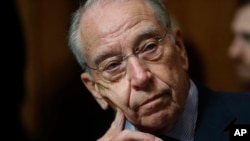Republican U.S. Senator Chuck Grassley on Wednesday called on the Trump administration to lift tariffs on steel and aluminum imports from Canada and Mexico before Congress begins considering legislation to implement the new U.S.-Mexico-Canada (USMCA) trade deal.
The three countries on Nov. 30 signed the pact replacing the North American Free Trade Agreement (NAFTA), which governs more than $1.2 trillion in trade. The agreement must be approved by the U.S. Congress and Canadian and Mexican legislators before becoming law.
"Unfortunately, our producers are unlikely to realize the market access promises of USMCA while the Section 232 tariffs on steel and aluminum imports from Canada and Mexico remain," Grassley, chairman of the Senate Finance Committee, said in a statement. His committee is in charge of shepherding the pact to approval in the Senate.
U.S. farmers — hardest hit by President Donald Trump's trade wars with China, a key buyer of American agricultural products, as well as Mexico and Canada — have long complained that with tariffs remaining in place, they will not be able to benefit fully from the new trade deal.
"Before Congress considers legislation to implement USMCA, the administration should lift tariffs on steel and aluminum imports from our top two trading partners and secure the elimination of retaliatory tariffs that stand to wipe out gains our farmers have made over the past 2½ decades," Grassley said.
Trump had vowed to revamp NAFTA during his 2016 presidential campaign. At times during the USMCA negotiations, he threatened to tear up NAFTA and withdraw the United States from the pact completely, which would have left trade among the three neighbors in disarray.
The U.S. Chamber of Commerce in 2017 said that exiting NAFTA without a new deal could devastate American agriculture, cost hundreds of thousands of jobs and "be an economic, political and national security disaster."
Grassley, a powerful senator from farming state of Iowa, said U.S. farmers, under pressure because of tariffs imposed by Mexico and Canada, as well as China, needed relief fast.
"We'll be working all hands on deck to get the job done. But we need the administration to help us pave the way," he added.





